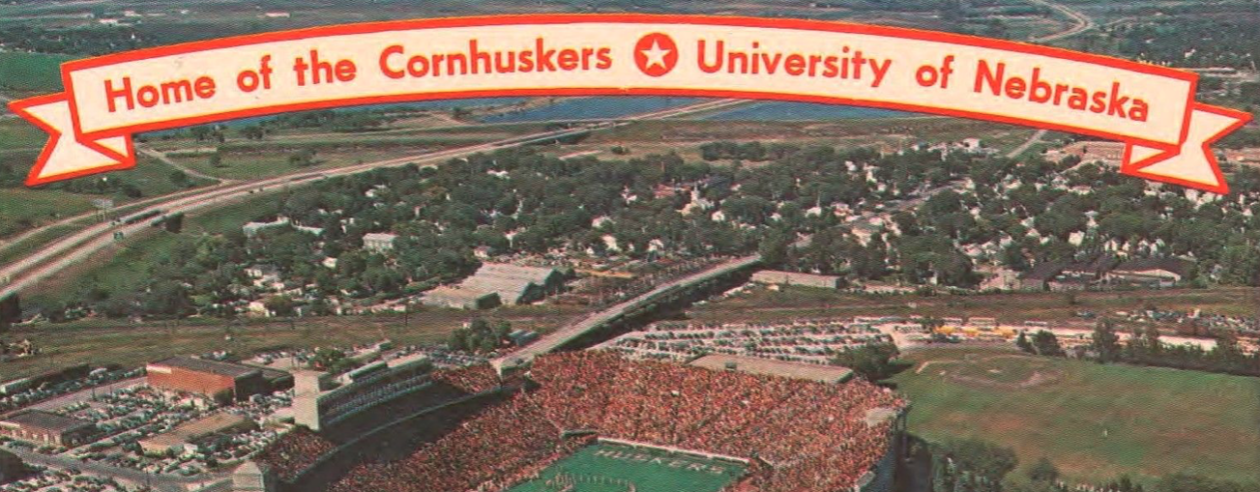Dirk Chatelain’s long-form biography of Coach Riley is an excellent, well crafted piece and is a must read.
Every word.
Every one sentence paragraph.
There’s no denying the care Dirk used when assembling it. What can we say? Game recognizes game.
However, one line gave us pause.
To quote Dirk: “…the local hero gave up everything he knew and cut a new trail east, trading his cruiser of a program for an Escalade.”
On the surface, the analogy is clear and easy to digest. By making the leap from Oregon State to Nebraska, Coach Riley swapped the key to his humble beach cruiser’s lock for the keys to a four-wheeled intergalactic spaceship of Olive Garden parking lots.

Oregon State on the left. Nebraska on the right.
In the companion video that illustrates Riley’s commute from his former home to Reser Stadium, Dirk says “Riley isn’t much of a car guy, even if it’s the safer form of travel.”
For being such a huge stat-head, Dirk makes a blanket statement that is not at all correct. Bicycling has been statistically proven, time and time again, to be the safest form of transportation with a death rate 15 times lower than driving a car.
Except of course when Cadillac Escalades harass and/or kill cyclists.
http://youtu.be/iCtpbNu0_jY?t=51s
Then there’s also the issue with the Escalade having the highest death rate in its own category at over twice the average.
But let’s climb out of the rabbit hole of statistical minutia and take a look at what the Escalade is on the surface.
It’s big.
Nebraska is a big state and Nebraskans are typically considered a big people, (in that strong, husky way of course).
It’s American made.
If you consider the Republic of Texas part of America.
It’s powerful.
Sort of. Weighing in at nearly 6,000 pounds, the Escalade requires a big engine for any semblance of speed, just as long as it doesn’t have to turn. And despite its SUV status, don’t even think about taking on an Oregon Trail-like expedition.
It’s loaded with all kinds of info-taining technologically wizardry.
Just like Memorial Stadium. We’ll overlook the part where Car and Driver calls the Escalade’s system annoying.
Its bench seating is cramped and uncomfortable.
Just like Memorial Stadium.
Its glory years were 2004 – 2007.
While the Escalade had its moment in the sun, Husker football was in the gutter. They both have yet to rebound to where they once were but at least the Huskers haven’t been reduced to being mocked by the New York Times for moonlighting as the heel in a second string Disney movie.
Cad-Spinner’s headshot from Planes: Fire and Rescue.
Maybe Dirk isn’t much of a car guy. Or maybe he used the first analogous vehicle that came to mind. Perhaps an editor thought his piece needed a quick hitter comparison for the simpletons beyond Omaha’s cosmopolitan borders.
We’ll pretend it was the latter.
It would greatly disappoint us that a writer as sharp as Dirk would leave a ball on the tee with a stout tailwind blowing straight down the pipe of a wide open fairway.
A year after Bob Devaney made his debut on the Memorial Stadium sideline, Dr. Ferdinand Porsche unveiled his new 911 at the 1963 Frankfurt Auto Show.

 Bob Devaney and Ferdinand Porsche embarked on their legacy defining work a only a year apart. The foundations they built are still recognizable to this day.
Bob Devaney and Ferdinand Porsche embarked on their legacy defining work a only a year apart. The foundations they built are still recognizable to this day.


The Huskers’ most recent masterpiece and the 2015 Porsche 911.
Before you get up in arms about the notion of a German car being symbolic of a team as American as the Huskers, think about the country where the bulk of Nebraska’s early pioneers came from.
Now, with that strong German heritage in mind, let’s take a closer look at the iconic 911.
From its 1963 debut through 1989, every year brought new variations and upgrades with many components remaining the same and were interchangeable from year to year.
When Porsche engineers felt they had wrung every last drop of performance out of the existing platform, they started over with a clean slate. The signature look and air cooled, rear engine design remained the same. The next few years that followed were spent working out the kinks of modernization.
By late 1993, another step in the 911’s evolution was taken. Three decades may have passed but perfection was finally realized. The next five years were a celebration of full potential reached. A car that should have ceased production by the time the 80s rolled around had found new life. A design that pundits had deemed antiquated was thriving and leaving its rivals in the dust in the 90s.
The historic run would come to an end in the fall of 1998 when the first 911s with liquid cooled engines rolled into dealer showrooms.
One era ends. Another begins.
Does any of that sound eerily similar to the fate of the Huskers?
Boom. Change a single detail and Dirk’s story takes on a whole new historical dimension.
— Bonus content —
While the 911’s history and philosophy meshes almost too perfectly with that of the modern era Huskers, if one single car were to truly epitomize Nebraska football, we’d be inclined to pick this bad boy.
The Dodge Viper GTS features a 488 cubic inch V-10 that puts out 450 horsepower the old-fashioned way. This beast has enough torque to rip the capitol off its foundation and isn’t afraid to take a punch in the mouth. Let’s hope Coach Riley found the keys to an unmarked storage shed in his welcome packet. It’s time to release the Kraken.
What car do you think is most symbolic of the Huskers?
Let’s hear ’em.




One thought on “Dirk Calls Husker Program An Escalade. Was That An Insult?”
Comments are closed.